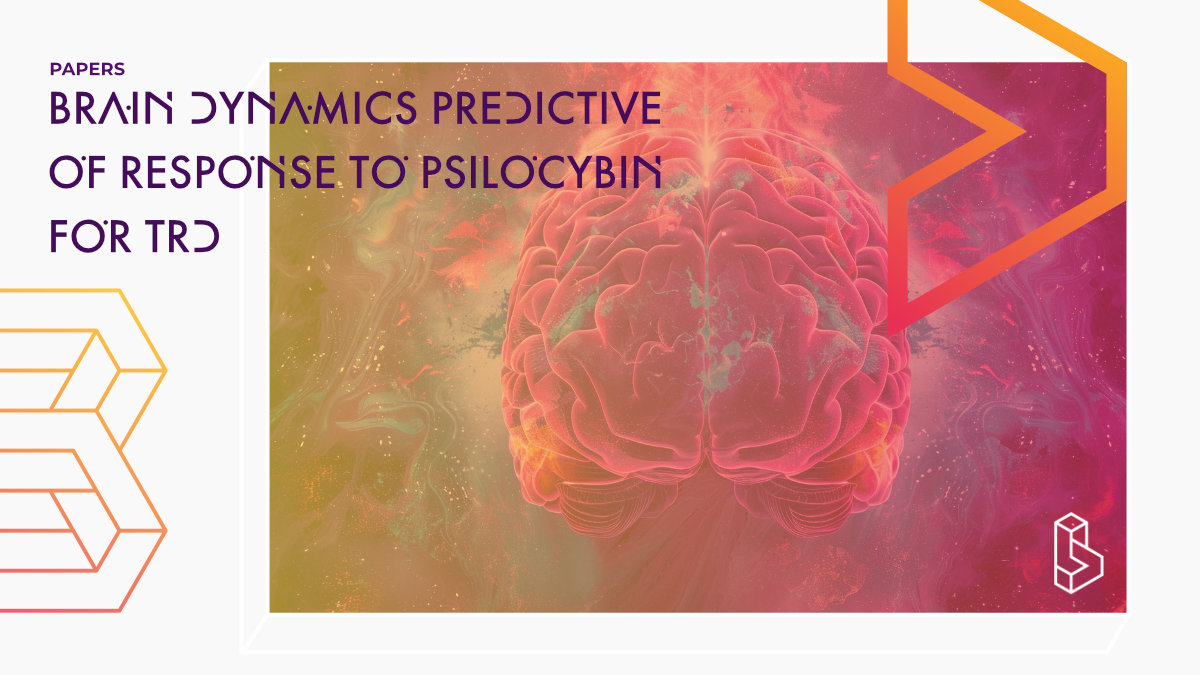This fMRI study (n=15) reanalysed data from a previous open-label study in which psilocybin (10-25mg) was used in the treatment of depression (TRD). After using whole-brain models to fit the spatiotemporal brain dynamics, dynamic sensitivity analysis identified brain regions in transition from a depressive brain state to a healthy one. The identified regions correlate with in vivo density maps of serotonin receptors 5-HT2A and 5-HT1A, providing further evidence for the role of serotonergic signalling in the recovery of depression via psilocybin.
Abstract of Brain dynamics predictive of response to psilocybin for treatment-resistant depression
“Psilocybin therapy for depression has started to show promise, yet the underlying causal mechanisms are not currently known. Here, we leveraged the differential outcome in responders and non-responders to psilocybin (10 and 25 mg, 7 days apart) therapy for depression—to gain new insights into regions and networks implicated in the restoration of healthy brain dynamics. We used large-scale brain modelling to fit the spatiotemporal brain dynamics at rest in both responders and non-responders before treatment. Dynamic sensitivity analysis of systematic perturbation of these models enabled us to identify specific brain regions implicated in a transition from a depressive brain state to a healthy one. Binarizing the sample into treatment responders (>50% reduction in depressive symptoms) versus non-responders enabled us to identify a subset of regions implicated in this change. Interestingly, these regions correlate with in vivo density maps of serotonin receptors 5-hydroxytryptamine 2a and 5-hydroxytryptamine 1a, which psilocin, the active metabolite of psilocybin, has an appreciable affinity for, and where it acts as a full-to-partial agonist. Serotonergic transmission has long been associated with depression, and our findings provide causal mechanistic evidence for the role of brain regions in the recovery from depression via psilocybin.”
Authors: Jakub Vohryzek, Joana Cabral, Louis-David Lord, Henrique M. Fernandes, Leor Roseman, David J. Nutt, Robin Carhart-Harris, Gustavo Deco & Morten L. Kringelbach
Summary of Brain dynamics predictive of response to psilocybin for treatment-resistant depression
Introduction
Behavioral differences between healthy and depressed individuals can sometimes be conspicuous, but identifying causal contributions from brain dynamics is more challenging.
Recent advancements in non-invasive neuroimaging techniques have made it possible to describe complex spatio-temporal dynamics in terms of their spatial and temporal information, but it is still unclear how transition between one state to another is made possible. The last decade has brought clear evidence that finer-grained, more dynamic analysis of brain states can deepen our understanding of their properties and relationship to behavioural states. These methods include data-driven heuristic clustering methods across time, dynamical systems informed phase-locking approaches, and spatio-temporal networks.
There are considerable practical and ethical challenges for answering mechanistic questions in humans, elevating the use of animal models or small clinically relevant populations. Whole-brain modeling could provide inspiration for the development of new, improved interventions. The present paper focuses on whole-brain network models that link regional dynamics with the neuroanatomical structure of the brain to describe the spatio-temporal activity of functional data. These models bypass the ethical constraints of human or non-human animal experimental settings.
Find this paper
Brain dynamics predictive of response to psilocybin for treatment-resistant depression
https://doi.org/10.1093%2Fbraincomms%2Ffcae049
Open Access | Google Scholar | Backup | 🕊
Cite this paper (APA)
Vohryzek, J., Cabral, J., Lord, L. D., Fernandes, H. M., Roseman, L., Nutt, D. J., ... & Kringelbach, M. L. (2024). Brain dynamics predictive of response to psilocybin for treatment-resistant depression. Brain Communications, 6(2), fcae049.
Study details
Compounds studied
Psilocybin
Topics studied
Neuroscience
Depression
Treatment-Resistant Depression
Study characteristics
Original Re-analysis
Open-Label
Participants
15
Humans
Authors
Authors associated with this publication with profiles on Blossom
David NuttDavid John Nutt is a great advocate for looking at drugs and their harm objectively and scientifically. This got him dismissed as ACMD (Advisory Council on the Misuse of Drugs) chairman.
Robin Carhart-Harris
Dr. Robin Carhart-Harris is the Founding Director of the Neuroscape Psychedelics Division at UCSF. Previously he led the Psychedelic group at Imperial College London.
Leor Roseman
Leor Roseman is a researcher at the Centre for Psychedelic Research, Imperial College London. His work focussed on psilocybin for depression, but is now related to peace-building through psychedelics.
Compound Details
The psychedelics given at which dose and how many times
Psilocybin 10 - 25mg | 2x
Linked Research Papers
Notable research papers that build on or are influenced by this paper
Psilocybin with psychological support for treatment-resistant depression: an open-label feasibility studyThis is the first modern study (n=12) on psilocybin and its effects on treatment-resistant depression (TRD). It shows that two sessions with psilocybin (10mg and 25mg) in combination with psychological support can reduce depressive symptoms over periods of one week to three months after treatment. Psilocybin was well tolerated by all of the patients, and no serious or unexpected adverse events occurred.
Linked Clinical Trial
Assessing the subjective intensity of oral psilocybin in patients with treatment-resistant depression: A Pilot Study (PSILODEP-PILOT)This open-label trial (n=12), also known as PSILODEP-PILOT is the first to test psilocybin in patients in the UK. The study found psilocybin (10-25mg, x2) to be well-tolerated.

